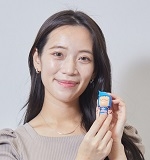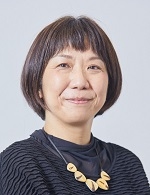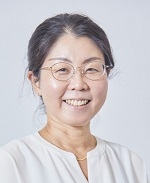Living Together with Japanese Language <2>
Interview with Lead Actor Fonchi and the Production Team of "ひきだすにほんご Activate Your Japanese!"
What Activates Our Communications (Part 2)
December 28, 2022
[Special Feature 077]
Special Feature: "Living Together with Japanese Language" (for more on special features, click
here)
The Japan Foundation (JF) and NHK Educational Corporation co-produced "ひきだすにほんご Activate Your Japanese!" which has been broadcast and distributed online since February 2022. The main drama segment of the program, "スアン日本へ行く!/Xuan Tackles Japan!" is a language learning program in which the main character, Xuan, who has come to Japan from Vietnam, improves her communication skills by learning strategies*1 for effective communication through her interactions with the people that she meets in her daily life and work. The story depicts Xuan and the people around her learning and growing together, and is peppered with tips for both people studying Japanese and native speakers to live together using Japanese as a communication tool.
We interviewed actor Ms. Fonchi, who played the role of Xuan, Ms. Mizutani Yoko, producer of the program, and Ms. Kikuoka Yuka, a senior lecturer at the Japan Foundation Japanese-Language Institute, Urawa, who supervised the production, about their thoughts on the program and stories from behind the scenes during production.
*There are several statements made during the interview that reveal parts of the storyline of the program. Please be careful if you are going to watch the program in the future.
See
Interview with Lead Actor Fonchi and the Production Team of "ひきだすにほんご Activate Your Japanese!"
What Activates Our Communications (Part 1) here.
We hope you enjoy the program as well as the interview.
For more information on the program, please check the website of the Japan Foundation Japanese-Language Institute,Urawa.
https://www.jpf.go.jp/e/urawa/e_rsorcs/hikidasu.html
You can watch "ひきだすにほんご Activate Your Japanese!" on NHK WORLD-JAPAN.
https://www3.nhk.or.jp/nhkworld/en/tv/activateyourjapanese/
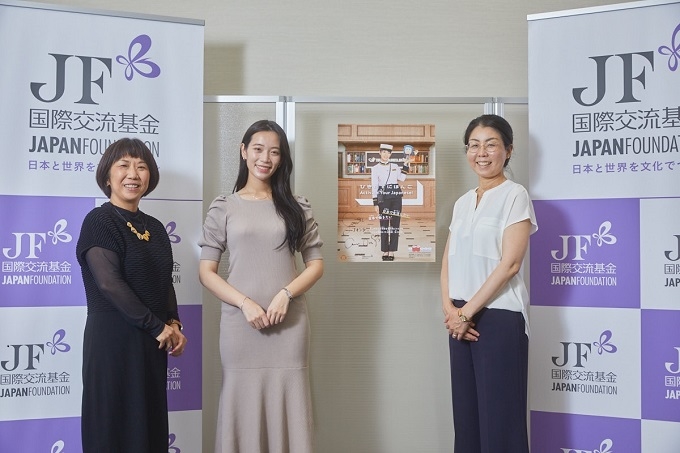
Interviewees
Mizutani Yoko (left in the picture; Senior Director, Content Production Development, Language Learning, NHK Educational Corporation)
Fonchi (center; Actor in "Xuan Tackles Japan!" who plays the role of Xuan, the main character)
Kikuoka Yuka (right; Senior Lecturer, The Japan Foundation Japanese-Language Institute, Urawa)
- ── The drama "Xuan Tackles Japan!" is characterized by the strategies that Yansu and Xuan come up with. What was the reason for placing strategies, rather than grammar and pronunciation, at the center of the program?
- Kikuoka: There are several reasons, but one of them has to do with the level setting of the program. JF produces a variety of teaching materials, and the A1 and A2 levels (introductory and beginner level) of the JF Standard for Japanese-Language Education*2 are well-developed. So this time, we decided to go a little further than that, to a program aimed toward the A2 to B1 level, and we came up with the idea that one of the important things for communication at that level is strategies. I have heard that people who are studying Japanese to come to Japan to work are fine up to the introductory or beginner level, but from there it gets very difficult. Based on that, I wondered if we could somehow nurture their ability to take another step forward based on what they have learned. When you hit a wall, don't give up; think of ways to overcome your difficulties by using your ability and the resources around you, or think of ways to do it better, and then actually do it. We defined such a series of thoughts and actions as a strategy; we believe that these strategies would be a force to support language learners, who have come this far but are unable to go further, to the next step. So we decided to focus on strategies, which I think is novel in this genre.
- Mizutani:
It is not often the case that a language learning program focuses on strategies. They are very important, but also very difficult to express. For learning vocabulary or grammar, you can easily organize the information that you provide to students, but the way to apply that information is different in different situations, and there can be different interpretations and no right answers, and it was actually very difficult to make such things into a program. But as Ms. Kikuoka just said, this is a hurdle that language learners always seem to run into. There is no doubt that by getting over this hurdle, students can proceed to the next step. So I wanted to make a program about that.
However, I remember it was quite difficult to come up with a proper way of doing it; I got questions like "Can you even call that a language course?" and I had a difficult time explaining it. - ── How did you explain it?
- Mizutani:
That was also a learning experience for me, or rather, I thought about it while doing it. I think there is a kind of way to receive and respond in each language. For example, in Japanese, there may be a specific expression that can convey a certain feeling, and if it were in English, it would be this way, and if it were in French, it would be that way, and so on.
I thought that learning such a method would be a fine language learning experience, even if it may not seem so at first glance. The method is very important knowledge and necessary for the future use of the language. "So, we can call it a language learning program, can't we?" is the answer that I have settled on.
There are 24 episodes of this program, and each one was quite a challenge to make. None of them were easy, or rather, they were made with a great deal of thought, from the settings to the solutions. - ── What were the criteria and what was important to you when selecting the 24 strategies?
- Kikuoka:
When selecting strategies to be covered in the program, we referred to the Can-dos*3 as per the JF Standard for Japanese-Language Education. This is a standard that lists which strategies are appropriate for certain levels. However, the Can-do statements were abstract, such as "If you don't understand something, you can ask them to repeat it," so we combined Can-dos with more concrete actions and expressions necessary for such actions, based on interviews with people who had come to the Japanese-Language Institute, past research, and our own teaching experience.
It was quite difficult to choose 24 strategies that were appropriate for the level set for this program, that were highly necessary, and that could be told in images, and that could be explained in the program. - ── Strategies can also be used by native speakers of Japanese; are there any of the strategies you covered that you like or have rediscovered?
- Fonchi:
It's hard to narrow it down to just one, but for example, the strategy "Say what you can, using words and phrases you know" in episode 3, "Say Something, Anything." I have a tendency to tell people things frankly because of my personality, and I sometimes found myself hurting my friends. Since we knew each other well, I thought it would be easier to understand if I told them straight, but my friends say, "You don't have to put it in such a harsh way."
Everyone has lived for a different number of years and in a different environment, so there are things that may not be conveyed to the other person at all, or on the contrary, may be conveyed excessively. I feel that if you don't convey your message in words, the message will not be conveyed to others as well as you think; I think this is a point shared by Xuan. - Mizutani: Interesting.
- Kikuoka: Is there anything you have come to use in your daily life?
- Fonchi:
The one thing that is common throughout the program is to "think from the other person's point of view." It goes back to what I said earlier, but everyone has a different personality, so it is important to think about how to communicate with the specific person you are speaking to. I began to think more about how I could convey the same message, for example, to this person in one way, or that person in another way.
Language, especially the Japanese language, is really deep. I think I have even more of an appreciation for that fact after playing Xuan. I felt that it does not matter whether you are a foreigner or a Japanese, you must put yourself in the other person's shoes and consider the other person's feelings.
I am a foreigner, but I feel like I am Japanese. However, in some parts of my life, I feel that I am a foreigner, so it is more difficult to find the right balance of how to convey my feelings. And now I'm more careful about it every time I say something to someone. - Mizutani: I feel passionately about all of the strategies. I had a hard time coming up with the best way to describe them, but anyway, something that's familiar to me is when Xuan asks her coworker, "Isn't that Mi-ke from 'Nyanko Piece'?" I mean, I do that too, trying to make conversation in that way.
- ── You are referring to Episode 5, "I Want Us to Be Friends," right?
- Mizutani:
When I first meet someone and I don't know where to start, I try so hard to find something in common to talk about, like something they have, or their hairstyle, or their hometown. I remember thinking, I actually do that quite a lot.
But maybe foreigners don't do this kind of thing. I am not actually sure, but I have also thought that if someone does not have much interest in what they have, maybe that won't serve as a topic of conversation. - ── In that sense, this may be a very Japanese strategy.
- Mizutani: The other thing we discussed among the staff was episode 11, which is called "ASAP Isn't Easy." There was quite a difference of opinion among the staff on this one, with some asking, "When is 'as soon as possible' in your opinion?" and so on.
- Fonchi: I recently had such a moment, actually. I was told, "as soon as possible," but I asked for clarification as to when the speaker actually meant saying, "By when exactly? Tomorrow? What time?" You know, I actually put the strategy "Ask when exactly it needs to be done by" into practice.
- Kikuoka: You are using the strategies (laughs).
- Mizutani: I'm sure they would be very useful for Japanese people (laughs).
- ── How about you, Ms. Kikuoka?
- Kikuoka:
I have feelings about all of them, but one that I simply loved as a scene was in episode 12, the florist episode, which is about the strategy "Send a signal that you want to end the conversation." It is very difficult to cut off someone in the middle of a conversation when they are talking comfortably, isn't it? I actually made this episode based on the chatterboxes I'm surrounded by, but they speak in a friendly way, which is why it's hard to cut them off. When we shot the florist scene, the person playing the florist (Ms. Osada Nao) did a great job of expressing that, and I could really see that Xuan was in a difficult situation. I think the situation of wanting to cut someone off but not being able to was well expressed. I really like that one as a strategy and as a scene.
Also, another one that I have a lot of feelings about in terms of the strategy is episode 15. It's about "Bring them into the discussion by asking for their thoughts." "What about you, Danny? Any thoughts?" is the key phrase, and it is beginner level Japanese. But when everyone is talking, I think it is quite difficult to be aware of those who are not talking, or to take care that they can join in on the conversation.
This is also based on a real situation. We often have group work at our institute's training sessions, and when we say, "Let's discuss this theme," those who can speak Japanese start talking among themselves. The people talking will have fun, and they will come up with some good stuff there as well, but that doesn't make it group work, does it? I had to figure out how to get everyone to discuss the issue, including those who were reserved and still silent. So I've always wanted the people who participate in the discussions themselves to have a sense that we are all going to discuss things together and to create a place together. So that sentence ("What about you, Danny?") itself is very simple, but it is a very important one, and I really wanted to include it. - ── Some of the strategies are ones that even native speakers of Japanese find it difficult to put into practice, and they seem to be very useful in everyday life.
- Kikuoka: When we talk about "living together," it is not only between foreigners and Japanese, but also among foreigners. In addition, I believe that there will be more and more situations in which people of different nationalities, ages, occupations, and other differences come together and live together while communicating in Japanese. At such times, I think it is important to have the attitude to stop and reflect on what you are doing on a daily basis, and I believe that learning strategies will help foster such an attitude. Therefore, I would like not only Japanese language learners but also everyone else who will live and communicate in society in the future to watch this program and think together.
- ──Finally, what would you like people to pay attention to in this program?
- Fonchi:
First, my image of language programs was very rigid. I had this image of people writing Japanese and foreign languages on a whiteboard or a blackboard, but actually, this program is simply enjoyable to watch and you can learn from it while enjoying it. Of course, I myself enjoyed playing the role from the bottom of my heart, and it was simply a great learning experience for me.
After playing Xuan, I think I've been applying this strategy-based thinking in my everyday life quite a lot. When I was younger, I did not feel a sense of responsibility or the weight of each word I uttered, but nowadays I think first before I speak, and imagine what the other person would think or how he or she would respond if I said this. Having played Xuan, I can now do that naturally.
This is a program where you can feel the depth and difficulty of the Japanese language, and at the same time, you can learn Japanese and get a sense of the other person's feelings and compassion. If each one of you who have watched this program, as well as those who will watch it in the future, can act based on those strategies and have compassion for others, it may be too much to say that the world will become a more peaceful place, but I believe that we can break down all barriers, Japanese or foreign, and relate to each other as a person. I myself sometimes feel that life is hard, but through this program, I felt that such compassion is important. I would be happy if people realized that. And I personally think that is also the underlying theme of this program.
But first and foremost, I will be happy if people simply enjoy watching it. - Mizutani:
Once the COVID-19 pandemic settles down, there will be many more foreigners coming to Japan, and I think society as a whole will change. What I would like the audience to see in this program is the portrayal of Xuan, played by Fonchi, as she struggles and thinks hard about what to say and how to say it. I think Fonchi played the part very well, and I hope that when you are spoken to by a Japanese language learner, you should understand that they are sweating and trying their best to speak the language.
Not everyone is fluent in Japanese, and they are trying to speak without a full understanding of the language, and the words they are saying may not mean what they really want to say. However, they are trying their best to communicate. I think that with this understanding, we can be kinder to others. By keeping this in mind, communication will proceed more smoothly and society will become a place where people can say what they want to say to each other. I think that is very important.
Of course it is obviously important to study the language, but what I am saying is a bit bigger than that. Words are a way for people to understand each other, and even if we cannot say them well, if we both try to understand how the other is feeling and what he or she is trying to say, I am sure that we will be able to create a better society. I would be happy if people could feel that. - Kikuoka:
First of all, I would like you to see the relationship between Xuan and Yansu, and Xuan's growth that's evident in her relationships with the people around her. At first, Xuan is often helped by others, but gradually she shows her growth as she begins to help those around her. But actually, Xuan in episode 24 is still not perfect at all. Xuan has grown up a lot, but there are still things she can't do, and in episode 24 she gets help from Rei. I hope that Xuan in episode 24 conveys the message that it is important both to gradually increase what one can do on one's own and, at the same time, and to skillfully ask for help from others when necessary.
Another thing is that I want everyone to feel the resilience of Xuan. Although Xuan is in the process of growing in terms of Japanese language, she will continue to communicate without giving up, making the most of the abilities she has. I hope that through Xuan's resilient attitude, you will realize the importance of believing in your own abilities and "activating" and "utilizing" those abilities.
For me, this program is a heartfelt message of encouragement for those who learn Japanese and want to live in Japan. I would be happy if the viewers could get that sense of encouragement. - Fonchi: The filming period was not that long, but it was a very intense time, and talking about it like this brings back memories. Just as Xuan has been helped by the people around her, I, like Xuan, feel that I have really been helped by the people around me. I couldn't have gotten through it without their help.
- Mizutani: There are so many people involved in the creation of this content. I would like to take this opportunity to thank them all.
- Fonchi/Kikuoka: Me too.
- Mizutani: It was a difficult, or at least challenging concept, but the team was very passionate about understanding it and making it into a solid program, and I think this is reflected in the finished product.
- Fonchi: Yes, it is just like the liveliness and warmth on set. Mr. Yoshida Oolongta, who played Mr. Minorikawa, and Mr. Tsujimoto Koji, who played Mr. Sudo, created a fun and lively working environment. When Ms. Fuse Eri, who played Ms. Ota, came to the set, the three of them made an unstoppable team. The cast worked really well together, and I think that sense of fun is clearly evident in the program. I hope viewers will enjoy that as well.
- *1 "Strategies" as used in language teaching refer to conscious actions taken to effectively achieve communication and learning objectives. In "ひきだすにほんご Activate Your Japanese!" we refer to the definition of strategies in the Common European Framework of Reference for Languages (CEFR: Learning, teaching, assessment), a shared framework for language teaching and learning in Europe. Based on CEFR's idea, we define "strategies" as not only the "action" part but also the "thinking" part, in which one judges the situation and consider how to act by leveraging their abilities and surrounding environment.
- *2 The JF Standard for Japanese-Language Education is a framework developed by the Japan Foundation based on the Common European Framework of Reference for Languages (CEFR) to consider course design, lesson design, and evaluation in Japanese language education. The level of Japanese is expressed in six levels from A1 to C2.
-
*3 Can-dos are standards written in the form of things that students can do, or simply do, such as things that they can do with the language, or which strategies they can use, or what stage of language ability they are at. Below is an example of a strategy Can-do.
E.g. CEFR 362: (strategy) Can ask someone to clarify or elaborate what they have just said.
The strategy Can-dos of the JF Standard for Japanese Language Education are directly based on the CEFR Can-dos.
 Mizutani says that it was quite a challenge to properly describe each one of the strategies, presented one per episode in this 24-episode series
Mizutani says that it was quite a challenge to properly describe each one of the strategies, presented one per episode in this 24-episode series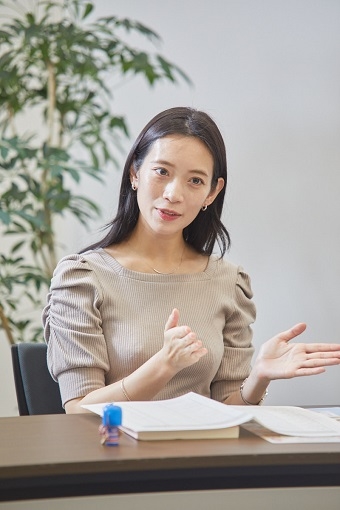 In real life, Fonchi says she is careful about how she conveys her thoughts and feelings
In real life, Fonchi says she is careful about how she conveys her thoughts and feelings 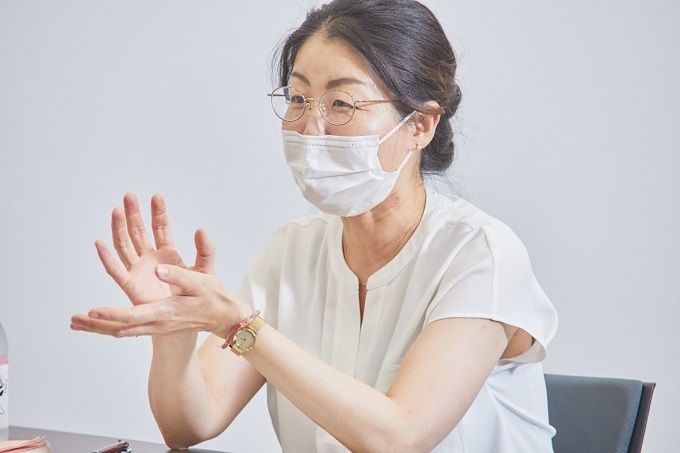 Kikuoka also utilized experiences from her daily life in deciding on the strategies covered
Kikuoka also utilized experiences from her daily life in deciding on the strategies covered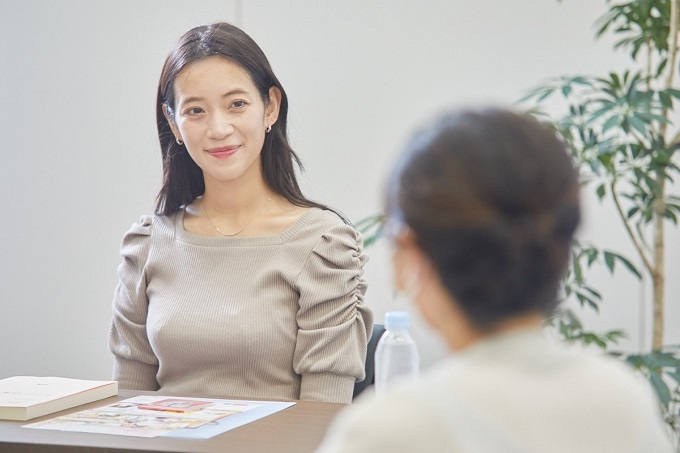
June 2022, Tokyo
Interview and text: Ishikawa Yui (Public Relations Department, The Japan Foundation)
Photo: Sasaki Maria
Related Articles
Back Issues
- 2025.11.14 Stories from Both Si…
- 2025.10.24 Dialogue through Ani…
- 2025.6. 9 Creating a World Tog…
- 2024.10.25 My Life in Japan, Li…
- 2024.5.24 The 50th Japan Found…
- 2024.5.24 The 50th Japan Found…
- 2024.5. 2 People-to-People Exc…
- 2024.5. 2 People-to-People Exc…
- 2023.12. 7 Movie Theaters aroun…
- 2023.6.16 The 49th Japan Found…


